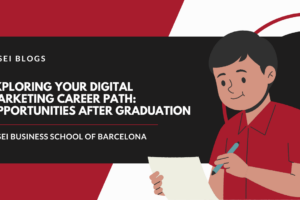
What Makes a Successful Digital Entrepreneur?
ESEI’s graduates go on to find success in corporations and startups all over the world. Many alumni even found their own online businesses and become successful digital entrepreneurs. Talk to us and find out how you can join our Bachelor’s and Master’s Programmes and learn all the skills you need to become the next big thing online.

People have always been entrepreneurial, seeing potential in new concepts, products and discoveries, then turning them into something more valuable and appealing to the market. The invention of the wheel spawned local transport services, electricity brought us light bulb companies, and with fire came KFC.
The internet, however, was a different story entirely. It ranks alongside the automobile in terms of impact on the way we live, work and communicate. With the outlandish success of companies like Amazon and eBay, came the growing realisation that ordinary people had access to customers from all over the world. A global market of at least 3.2 billion people at your fingertips, from the comfort of your living room. Internet users started doing business in their pyjamas, and they – frankly – loved it.
Unsurprisingly, this gave rise to an explosion of digital entrepreneurs and even more with the advent of broadband and then the smartphone. While very few people will ever reach the same heights as the Mark Zuckerbergs, Elon Musks, or Jeff Bezos-es of the world, just about anyone can now start an online business, if they have the right mindset.
A digital entrepreneur harnesses the reach and power of the internet in order to offer products and services for profit. They possess all the characteristics of a traditional entrepreneur–vision, determination, persistence and creativity–but also a number of other key traits.
The ability to scale…massively
The most successful digital entrepreneurs target a specific niche and then, if and when they find success, broaden their horizons and scale.
Jeff Bezos’ Amazon is a case in point; his business started life as a simple online bookstore, became a multipurpose, global marketplace, and then turned full circle and is now also a bricks and mortar bookshop. Bezos became the richest person in the world this year, albeit only briefly.
Mark Zuckerberg, too, initially targeted a specific niche with Facebook: college-aged students at Harvard, then students at Ivy league colleges. He opened it up to a broader US and Canada market soon after. Today, the platform is global with 2 billion monthly active users, thanks to its inbuilt scalability and incredible adaptability.
Then there’s Airbnb, which started out as Airbed & Breakfast. Founders Nathan Blecharczyk, Brian Chesky and Joe Gebbia saw a big increase on hotel rates ahead of a conference in their hometown of San Francisco and decided to make a little money online by renting out apartments as an alternative.
With 11 million overnight stays since this rather inauspicious start, the company hit on three things; a transparent review and booking service that was appealing to a whole range of traveller, a near unlimited number of potential service providers, and the ability to scale with each digital sign up (while competing hotels must build or buy new properties).
Become a leader and true digital entrepreneur through hands-on and project based learning. Find out more about our course here: Why a Master in Digital Entrepreneurship?
The ability to make lightning fast pivots
The internet is a petri dish for digital entrepreneurs and startups, and those of us observing can see their evolution in real-time. For some, like Airbnb, that means a meteoric rise to success, and then, for others like Vine, an unceremonious crash back down to earth.
If we look at Facebook again, what strikes us most is how the company is adapting in order to accomplish its goals. As a result of shifting user behaviour and needs, which are reflected in mountains of complex data available only to Facebook big data scientists, we see constant updates and changes, news feed tweaks, and a fast growing number of ways to advertise.
The company now harnesses and sells your data, shares it with integrated apps and platforms; it offers pixels to companies so that they may re-target ads to leads who have visited their websites; it provides streaming video ads, a publishing platform, VR services, and fine-toothed market segmentation, sponsored posts… the list goes on and on.
In essence, Zuckerberg took Facebook from a simple social media platform to a full on B2B marketing platform (and soon, it will probably be a complete entertainment service, with an exclusive news resource built on top).
Whether Zuckerberg could see the future or not is hard to say, but what he does do is demonstrate enviable adaptability, a stomach for unrelenting innovation all moving towards his vision. Young digital entrepreneurs have a lot to learn from his example. As he shows clearly, an unwavering vision calls for extreme flexibility.
Resistant to unexpected missteps and upsets
Uber, the on-demand taxi service, is having a particularly tumultuous year, with dramatic C-level changes, protests from competing taxi services all around the world, and now an outright ban of its services in London. Only time will tell if the company is resistant enough to withstand so many blows.
Somewhat less dramatically, Facebook is fast losing a young demographic in favour of the silver surfers. The current challenge for Zuckerberg and his team, is to appeal to the youngest Millennials and Generation Zers, which he’ll likely do through the acquisition and development of apps that appeal to a younger market.
Young digital entrepreneurs must learn that just because something works well today, doesn’t mean it will tomorrow. Outside forces, including aging users, changes to the law and strong competition can all adversely affect formerly perky business models.
A preference for disruption
Alphabet is a rule maker and a rule breaker. What was once a simple search engine named Google, became one of the biggest drivers behind the growth of digital entrepreneurship and online business.
By operating constantly shifting algorithms that control who or what appears in its online listings, the company controls how people build, populate and market their websites. When it rolls out a major change to its algorithm, many business owners find that their once fully search engine optimised website is now practically invisible. Business owners must then resort to paid ads as a result.
On a smaller scale, the best digital entrepreneurs use disruption like this to their advantage – and find ways to upset the market, competitors and use the new rules they have laid out in order to profit. Netflix unseated Blockbuster in this way, Airbnb became a headache to hotels, and Uber is reinventing private transport hire options.
Though, today nearly every entrepreneur has a website and some social media presence, not every one of them could be considered a true “digital entrepreneur”. It’s a challenging, ever-shifting game with unclear rules, and enormous rewards. Those that succeed have a vision, adaptability and an enormous capacity to innovate.
The Masters in Entrepreneurship programme at ESEI teaches future entrepreneurs the complexities of information and communications technology. Our mission is to foster creativity, innovation and entrepreneurship. Do you think you have what it takes?
Contact us now or read more about our programme.



